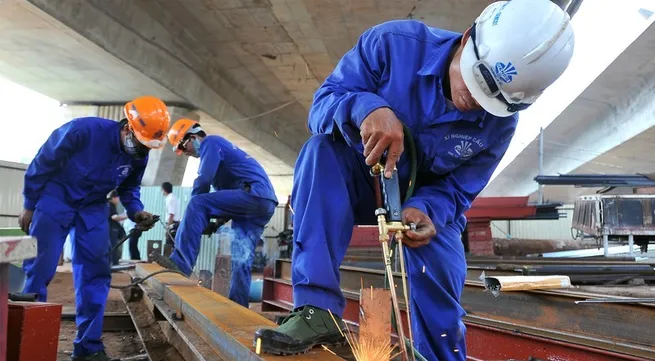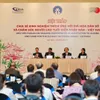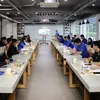Removing difficulties for businesses to promote growth

Vietnam’s economy tends to be more positive than in the last months of the year, but the difficulties and challenges posed are still great and cannot change quickly in a short time, due to dependence on global economic developments. In that context, ministries, branches and localities are making efforts to synchronously implement policies and solutions suitable to the new situation, to support people and businesses to take advantage of every opportunity to recover quickly.
Breakthrough from the working group model
The Hanoi People’s Committee has just decided to establish a special working group to remove difficulties and obstacles and effectively support businesses, investors and projects. The working group is headed directly by the Chairman of the City People's Committee Tran Sy Thanh, members are Vice Presidents of the City People's Committee, representatives of departments and branches; and some experts.
One of the requirements set for the working group is to coordinate and completely solve problems arising during the implementation of investment projects, production and business activities of enterprises in the city; at the same time, directing research, reducing and simplifying procedures for project investment, implementing mechanisms, policies and solutions, to support businesses, etc.
Since the end of May 2023, many localities throughout the country have implemented the working group model under the direction of the Government in Resolution 50/NQ-CP, dated April 8, 2023. This content is repeated in Resolution 105/NQ-CP, dated 15/7/2023, with the request of ministries, branches and localities to promote the effectiveness of the Special Working Group.
Implementing the Resolution, several provinces and cities have been flexible and creative in their ways of doing things, in line with local realities. For example, Bac Ninh Province has established five expert groups to solve difficulties in the fields of investment and planning; construction, land, environment; security, safety and labour, besides the special working group to solve difficulties and problems for enterprises, cooperatives and business households in the province. According to economic experts, this approach has created a positive movement in the government system at all levels, contributing to strengthening the confidence of the business community in the management agency.
Accompanying the production and business community is not a new way of doing things on the path of Vietnamese enterprise development, but setting up a special working group in localities is the first solution to be applied, suitable for Vietnamese enterprises and new developments of the economy, to realise the growth target in 2023.
At the central level, the Prime Minister has drastically directed the establishment of steering committees, interdisciplinary working groups and special working groups, so it is also necessary to have a mechanism to remove difficulties right from the grassroots level, directly into projects and businesses that are facing difficulties through local working groups, so as not to let difficulties accumulate for a long time.
Increasing capital absorption
According to the General Statistics Office, in the first seven months of 2023, the whole country had 89,600 newly registered enterprises, with a total registered capital of 834.3 trillion VND and 588,900 registered employees. Among this data, the only growth rate was recorded in the number of newly established enterprises, with a slight increase of 0.2% over the same period; data on registered capital and labour both decreased by 17.1% and 5.2%, respectively. Notably, on average, there are still 16,200 businesses withdrawing from the market every month.
In that context, removing difficulties for production, and business, and maintaining and restoring the health of the business sector, is identified as one of the top priorities. The task is to have effective solutions to increase the capital absorption capacity of enterprises.
Dau Anh Tuan, Deputy General Secretary cum Head of the Legal Department under the Vietnam Confederation of Commerce and Industry (VCCI), pointed out the shortcomings in the current policy coordination: the General Department of Taxation is late in refunding value-added tax (VAT), up to trillions of dong for export businesses. Along with that, the management agencies are slow to handle administrative procedures in the process of investment, production and business, which is increasing the operating costs of enterprises.
This contradicts the efforts of the Government and the State Bank of Vietnam in reducing interest rates to increase access to capital and reduce costs for the business community and investors.
Considering that it is necessary to shorten the policy lag to have a faster and more effective impact on businesses and the economy, Dr. Can Van Luc, Chief Economist of the Bank for Investment and Development of Vietnam, recommended that with fiscal policy, it is necessary to speed up the implementation of VAT refunds and policies to defer taxes, fees and land rents; consider transferring the remainder of the Recovery Programme to the Social Housing Development Fund, so that it can provide low-interest loans and a sustainable source of funding; improve the operational efficiency of the Small and Medium Enterprise Development Fund and the credit guarantee funds for small and medium enterprises in localities.
All decisions need to be assigned responsibilities, specific deadlines, and strict sanctions if they are not implemented. In addition, it is necessary to have a correct and accurate assessment of the business situation; thereby promptly and accurately removing the problems that have been pointed out and are interested in supporting businesses that are negatively affected by the decline in exports, investment, and consumption through solutions to better exploit signed free trade agreements; continue to promote the substantive improvement of the investment and business environment, administrative procedures, especially the official duty performance apparatus; effectively implement promotional measures, stimulate domestic trade and tourism.
Tags:





